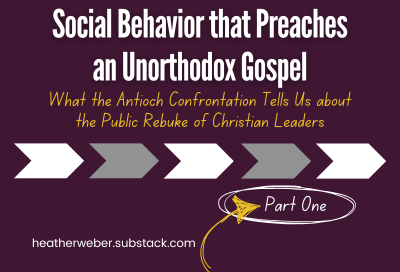Part 1-Social Behavior that Preaches an Unorthodox Gospel
What Paul vs. Peter Teaches Us About the Public Rebuke of Christian Leaders
In the spring of 2023, stories of cult-like behavior and sexual abuse enabled by college campus ministers in my fellowship, the Assemblies of God, broke the news cycle. The roots of the abuse spanned decades, a continent, and several Chi Alpha campus ministry chapters in Texas from which ministers took students to visit a convicted sex offender. In short, college students (and the young children of one minister) were pressured to practice nudity, masturbate, and/or were sexually assaulted. For a lengthier, more in-depth understanding of all that transpired, first-hand testimony, and a repository of news articles, you can spend hours on this website and allow your horror to mount.
When the story broke, I was struck by a catch-phrase known to students. While many did not know of specific abuse that was occurring, “nudity is unity” or “nudity brings unity” reflected the unorthodox practice encouraged by their leaders—young Christians getting naked together. Not all of the students knew of explicit sexual activity and/or abuse happening behind the scenes, but they were aware of the ideology, as taught by their leaders, that group nudity was somehow linked to Christian bonding.
To state the obvious, the social behavior and teaching of these leaders perverted the gospel message of Jesus Christ, which claims that unity comes through Christ’s reconciling power on the cross (Eph 2:14-16). Over the years, many individuals objected or expressed their concerns in private about the ministries’ activities and its association with a volunteer who was a known sex offender. However, while many private objections were made to leaders at the local, state, and national level, there was not one resounding authoritative and public Christian voice that was able to nip these practices in the bud.
Since the scandal became public, I have often meditated on the New Testament conflict between the apostles Paul and Peter at the Antioch church. Here, Paul rebukes Peter for behavior that perverts the gospel message. I wanted to formally examine the conflict in light of the way M. Sydney Park describes Peter’s behavior as a “social deviance from [orthodox] theology.”1
In Antioch, Peter withdraws from table fellowship with Gentiles, and Paul’s unequivocal public rebuke is necessary for rescuing the church from an unorthodox gospel. In this Substack series, I hope to shed light on the intensity and tone of Paul’s public rebuke, why it was necessary, and how it may guide us today as we consider the necessity of publicly rebuking leaders whose social behaviors “preach” an unorthodox gospel message.
In my experience, intra-denominational Christians seem reluctant to openly rebuke their leaders. There are certainly appropriate times for reluctance and restraint, but I am concerned that restraint and silence has become our default setting, to the detriment of the church. What if there had been an outspoken “Paul” in the early years of every ministry that turned perverse?
Hence, my examination of Peter’s very public rebuke and Paul’s narration of the event to another group of Christians (the Galatians). This is certainly not an exhaustive examination of all the New Testament (or all of Scripture) has to say about conflict between believers. Consider it a one-inch-by-one-inch square of much larger tapestry, a square inch that offers valuable insight despite being small.
If you’d like to follow along with this series, you can follow on the app or subscribe below (for free) so new posts go directly to your inbox.
Thanks for reading. I’m a book-obsessed pastor, seminarian, podcaster, and author. For essays and podcasts that come straight to your inbox, subscribe to this Dear Exiles newsletter in the subscription box above. Fun fact: I’m also the author of Dear Boy:, An Epistolary Memoir and the host of the Your Pastor Reads Books podcast.
M. Sydney Park, “Letter to the Philippians,” in The New Testament in Color: A Multiethnic Commentary, ed. Esau McCaulley et al. (Downers Grove, IL: InterVarsity Press, 2024), https://ebookcentral-proquest-com.theoref.idm.oclc.org/lib/dtl/detail.action?docID=31149482.



